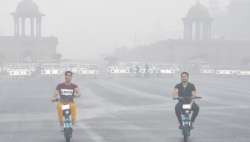Delhi most polluted capital; fourth most polluted city in world, says World Air Quality Report
A supersite will be established on Pandara Road in Central Delhi by the end of July to identify sources of pollution in real-time. With this, Delhi will become the first city in the country to identify the real-time source of air pollution through its apportionment system.

With a 14.6 per cent increase in PM2.5 concentration in 2021, Delhi has emerged as the most polluted capital and the fourth most polluted city in the world. The 2021 World Air Quality Report by Swiss Organisation IQAir suggests 35 of the world's most polluted cities are in India. The report also put 63 Indian cities in the world's 100 most polluted cities.
Meanwhile, the Delhi government has said real-time data on pollution sources in the national capital will be available from August 1.
A supersite will be established on Pandara Road in Central Delhi by the end of July to identify sources of pollution in real-time, it said after Chief Minister Arvind Kejriwal chaired a review meeting with teams from IIT Kanpur, IIT Delhi and The Energy and Resources Institute (TERI) on the ambitious Real-Time Source Apportionment System and Pollution Forecasting Project.
With this, Delhi will become the first city in the country to identify the real-time source of air pollution through its apportionment system.
The project will help identify the factors responsible for the rise in air pollution at any given location in Delhi. It will help understand the impact of pollution sources like vehicles, dust, biomass burning, stubble burning and industrial emissions.
Based on the results, the government will be able to take the necessary steps to curb the specific sources of pollution.
Additionally, pollution forecasting will help the government take significant policy decisions regarding school closures, construction restrictions and vehicular restrictions beforehand.
Kejriwal said real-time identification of pollutants will significantly help in taking controlling measures and reducing pollution.
During the review meeting, Professor Mukesh Khare from IIT Kanpur informed the chief minister that a mobile application will also be developed as part of the system.
"In Delhi, pollution remains in the 'moderate category' around October 9 every year.
"After that, the pollution level starts increasing suddenly. Looking at NASA's photos, it has been noticed that a large amount of stubble is burnt during that period. Whereas, the figures every time say that only five per cent of Delhi's pollution can be blamed upon stubble. In such a situation, it is important to ascertain the actual contribution of stubble in Delhi's pollution and how much other factors contribute. This would enable real-time detection of factors causing pollution in the state and help in controlling that source of pollution," a statement quoted Kejriwal as saying.
(With inputs from agencies)